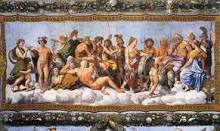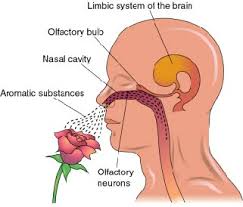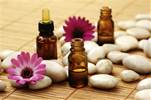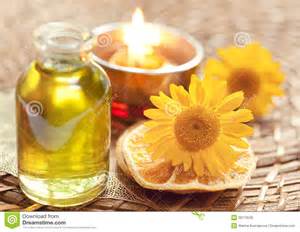






If the Ancient Egyptians perfected the art of using the essences of plants to control emotion, putrefaction and disease, new discoveries of the medicinal power of plants continued to be made. The Greeks, for instance, developed medicine from a part-superstition to a science. Hippocrates, popularly known as the Father of Medicine, was the first physician to base medical knowledge and treatment on accurate observation, and ever since, of course, doctors have adhered to his principles outlined in the Hippocratic Oath. One of his beliefs was that a daily aromatic bath and a scented massage were the way to health, very much a central principle of today`s aromatherapy.
He was aware of the antibacterial properties of certain plants and when an epidemic of plague broke out in Athens he urged the people to burn aromatic plants at the corners of the streets to protect themselves and prevent the plague spreading. At this time, too, botanical knowledge was expanding, reaching its peak in the Historia Plantarum of Theophrastus, the so-called Father of Botany.
At the height of the power of Rome, it was "immigrant" Greek physicians and seekers after knowledge who dominated the medical world.One of these was Dioscorides, a Greek surgeon in Nero`s army, who wrote De Materia Medica, a comprehensive textbook on the properties and uses of medicinal plants. it was he who recorded further details such as when a plant and its active principles might be most powerful. This indisputable fact of plant life-that the principles are not always the same, depending on the time of day, time of year, and state of development-is utilized by the essential oil industry today, nearly 2´000 years later.
For instance, the poppy`s yield in the morning is four times greater than in the evening. Jasmine`s perfume and therefore its oil`s powers, are strongest in the evening; this is why Jasmine flowers are still picked at night in India for their olfactory qualities. Dioscorides also first used a decoction of willow to cure pain such as that caused by gout (it is this decoction which has since become our most common analgesic, aspirin).
The Romans, although more interested in the culinary than the medical properties of plants, were botanically enormously influential. As the legions advanced over Europe, the soldiers took with them seeds of the plants they needed or could not live without, to cultivate in the countries they occupied. Many herbal plants in England - parsley, fennel and lovage, for instance-were introduced by the Romans. Many still grow in the greatest profusion in the wild along the routes taken by the soldiers, seeds having dropped by the roadside, or around the old Roman settlements.
Reference:Aromatherapy: The Encyclopedia of Plants and Oils and How They Help You: Daniele Ryman









In the umbrella term of depression there are a variety of symptoms, of emotional distrurbances, which affect the physical and mental states of well being.These emotional states are not rare, and are often displayed by a large number of people facing difficult or unacceptable situations in their daily lives.When these disturbances re-occur on a daily basis, without periods of calm or control, and begin to interfere with our planned routines, they can and are often classified as a form of depression.
A few common forms of depression: Agitated or Anxious depression:
Constantly moaning, fidgeting or twiddling with something.e.g., hair, pens, desks, just anything, causes pressure headaches, eye problems, twitches, ticks, jumping muscles, the head feels as if it is about to explode.
Astounding/Endogenous depression:
Sufferers are often hard working and ambitious people, this is also known as `burn out`.
Exogenous depression:
Symptoms stem from an identifiable event.
Hysterical depression:
The hysterical depressive exaggerates everything, and needs to be noticed and given attention at all times.They heave great sights, shout scream and argue on and at every occasion possible.They might be vivacious one minutes and suicidal the next.
Lethargic depression:
The lethargic depressive wants to stay in bed all day, and covers their head with the pillow or duvet.This individual never wants to do anything, they expect everything to be done for them, and the world must revolve around their symptoms. Everything becomes overwhelming, writing letters, phone calls, and general tasks.
Manic depressive psychosis:
Extreme mood swings and behaviour patterns are the distinct traits of manic depressive psychosis, this is much rarer than other forms of psychosis. During the manic stage the individual will be at the peak of positivity, more talkative, their thoughts will be racing, there are often too many projects to complete, and they are often set at unrealistic goals for completion.There is often loud laughter and hard play, when denied a request, they can be violent.The next phase is a reaction of extreme guilt and a constant declaration of, I‘m sorry I did not mean to do or say that, ect.
Passive Depression:
Passive depressives do not join in conversations, they just sit there as part of the furniture, and often pretend to agree with people, so that they are liked and accepted. They keep their own opinions to themselves, so that there are no arguments. Passive depressives can be troublesome, and one of their specific traits is to accept rewards, without personal effort, they often find the easy way to do things.
Weepy depression:
Crying for no apparent reason and unable to control the tears, when asked gently, why are you crying, there are usually more tears, and an expression of total confusion.
Ref:Fragrant Pharmacy:V.Wormwood.








Aromatherapy is the use of organic essences of aromatic plants for healing and the maintenance of vitality.The essences,
or `essential oils` as they are commonly known, are extracted from a wide variety of plants, and are very concentrated.
For example it takes the petals from about 30 specially cultivated roses to produce one drop of rose essential oil and several kilos of lavender to produce a small bottle of essential oil.
Each oil has it`s own unique healing properties and fragrance. One essential oil may contain over one hundred different chemical constituents:
REFERENCE:Aromatherapy Guidelines








| A | B | C | D | E | F |
| Application | Babies | Chakras | Diabetes | Eucalyptus Oil | Fragrant Pharmacy |
| Aromatherapy is Science Based | Bruises | Children |
Elderly |
Flying | |
| Colds & flu | Emotional Well Being | ||||
| Cramps | |||||
| G | H | I | J | K | L |
| journey | Lavender Oil | ||||
| Lymphoedema | |||||
| M | N | O | P | Q | R |
| Mens Health | Natural Plant Oils | Romance | |||
| S | T | U | V | W | X |
| Threats to the Forests | Vaginal Infection and Inflammation | ||||
| Treating Acid Environments | Vinegar Treatment for Thrush | ||||
| Thrush Treatments-Men/Women | Videos | ||||
| Thrush Candida (case History | |||||
| Y | |||||
- Home
- Vaginal infections and inflammation
- Threat to the Forests
- The Vinegar treatment for Thrush
- Treating Acid Environments
- Your Basic Travel Kit - Tummy Troubles
- Pamela L. Crowell on the Prevention and Therapy of Cancer by Dietary Monoterpenes
- Thrush (Candida) Case History
- Problems In Pregnancy
- Thrush treatment for Men- Women
- The Work of Anne-Marie Giraud-Robert
- Fragrant Pharmacy
- Applications For Your Basic Care Kit - 4
- Whooping Cough
- Lymphoedema
- Bites and Stings - General Action - Your Basic Travel Kit
- The journey
- Your Basic Travel Kit - Fevers
- Applications For Your Basic Care Kit - 3
- Aromatherapy-Cramps
- Your Basic Travel Kit - The Heat
- Aromatherapy-Articles-A-Z
- Verrucas and Warts
- Rabid Bites and Scratches - Your Basic Travel Kit
- Your Basic Travel Kit
- Wrinkles and Ageing Skin - Facial Scrubs
- Wrinkles and Ageing Skin - Cleansers
- Wrinkles and the Ageing Skin
- Fragrant way to Beauty - 2
- The Fragrant way to Beauty
- A-Z of Dance and Sports Injuries - 7
- A-Z of Dance and Sports Injuries - 6
- A-Z of Dance and Sports Injuries - 5
- A-Z of Sports and Dance Injuries - 4
- A-Z of Sports and Dance Injuries-3
- A-Z of Sports and Dance Injuries-2
- A-Z of Sports and Dance Injuries
- Aromatherapy - Locker Room Scents
- Aromatherapy- Stress & Sports - Jacuzzis
- Aromatherapy-stress & Sport - Saunas
- Aromatherapy - stress & Sport - Showers
- Stress and Sport - Aromatherapy
- Foot Care - 2 - Aromatherapy
- Foot Care - Aromatherapy
- MUSCLES-Aromatherapy
We have 22 guests and no members online
